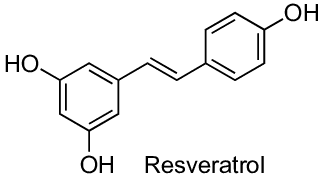What are the health benefits of resveratrol to prostate cancer?

Prostate cancer
This post is to reveal the health benefits of resveratrol on prostate cancer. Prostate cancer is one of the most common cancers diagnosed in men at old age. The incidence of prostate cancer increases exponentially for men over 65 years of age. Fortunately, the progression of most prostate cancer is very slow. Men often die of old age before the cancer can kill them. This allows the use of natural products to control cancer growth, instead of more aggressive approaches such as chemotherapy. Resveratrol is one of a few natural products with minimal adverse effects.
Most prostate cancers originate from epithelial cells of the prostate. However, the stromal cells also play an important role in cancer initiation, growth and metastasis (spreading to other body parts, such as bone) by secreting growth factors and proteolytic enzymes. The growth factors protect the tumor cells from apoptosis (programmed cell death). The proteolytic enzymes facilitate the metastasis of cancer cells and their invasion to other body parts.
Health benefits of resveratrol
Consumption of resveratrol-rich food reduces the incidence of prostate cancer. Studies using cultured cells and animal models showed that resveratrol possesses strong anti-cancer properties. It inhibits prostate cancer development through different mechanisms. On one hand, it inhibits prostate cancer growth by suppressing the androgen receptor signal pathway. It modulates expression of androgen-receptor-regulated genes by enhancing degradation of androgen receptor as well as its synthesis. On the other hand, it interrupts communication between stromal and epithelial cells. It can inhibit cancer cell migration by blocking secretion of specific growth factors from stromal cells. It also suppresses metastasis of prostate cancer cells to the bone by targeting the extracellular matrix. Dietary resveratrol lowers the incidence of prostate cancer in transgenic mice.
Many problems need to be solved before resveratrol can be used for prevention and treatment of prostate cancer. One problem is to determine the right dose. Resveratrol can behave as both pro- and anti-oxidant depending on concentration. At low concentration, resveratrol serves as pro-oxidant that favor cancer cell survival. However, at high concentration it stimulates superoxide production leading cancer cell death.
Other problems with resveratrol are poor water solubility, low chemical stability and short biological half-life. Using nanoparticle formulation, the anti-cancer properties of resveratrol are greatly enhanced. Nanoparticles protect resveratrol against degradation, increase its delivery to the cancer cells, and improve its bioavailability. However, these results have not yet been confirmed with clinical trials. Limited clinical trial showed no effect of resveratrol on testosterone and PSA levels or prostate volume.
References
- Silk N, Reich J, Sinha R, Chawla S, Geary K, Zhang D. The Effects of Resveratrol on Prostate Cancer through Targeting the Tumor Microenvironment. J Xenobiot. 11:16-32, 2021.
- Annaji M, Poudel I, Boddu SHS, Arnold RD, Tiwari AK, Babu RJ. Resveratrol-loaded nanomedicines for cancer applications. Cancer Rep (Hoboken). 4:e1353, 2021.
- De Amicis F, Chimento A, Montalto FI, Casaburi I, Sirianni R, Pezzi V. Steroid Receptor Signallings as Targets for Resveratrol Actions in Breast and Prostate Cancer. Int J Mol Sci. 20:1087, 2019.
- Kjaer TN, Ornstrup MJ, Poulsen MM, Jørgensen JO, Hougaard DM, Cohen AS, Neghabat S, Richelsen B, Pedersen SB. Resveratrol reduces the levels of circulating androgen precursors but has no effect on, testosterone, dihydrotestosterone, PSA levels or prostate volume. A 4-month randomised trial in middle-aged men. Prostate. 75:1255-63, 2015.